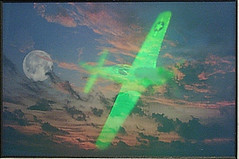Congress made it clear in passing the Military Commissions Act that torture was not an available option for the C.I.A.
The White House apparently lost when Congress overwhelmingly passed the Military Commissions Act of 2006. It forbids detainee abuse, using specific language that experts on human rights and international law say would be hard, if not impossible, to circumvent legally.
Those experts were subsequently shocked by what Bush said in the East Room of the White House when he signed the bill last October. "This bill will allow the Central Intelligence Agency to continue its program for questioning key terrorist leaders and operatives," Bush said. "[The CIA] program has been one of the most successful intelligence efforts in American history."
Since the Red Cross wasn't told about al-Hadi, there's no way to know if he was tortured while in CIA custody.
In its statement to Salon, the CIA also said that it had no legal responsibility to alert the Red Cross of al-Hadi's status, calling him an "unlawful combatant," a categorization that critics charge the Bush administration has used to circumvent the Geneva Conventions. The CIA acknowledged that the Department of Defense alerted the Red Cross about al-Hadi -- but suggested DoD was not required to do so.
The Red Cross is being allowed to see all the Guantanamo detainees, although grudgingly:
"Although, as unlawful combatants, these detainees have no legal claim to ICRC [International Committee of the Red Cross] visits, those visits have been arranged at Guantánamo," the CIA said.
The question arises whether the CIA detainees, the ghost prisoners, are being treated differently than the DOD detainees.
Specific authority for covert operations in the war on terrorism were put in place by a secret "presidential finding" signed by Bush six days after the terrorist attacks of Sept. 11, 2001, authorizing broad covert action by the CIA to capture, detain or kill members of al-Qaida anywhere in the world. Mary Ellen O'Connell, a professor of international law at Notre Dame Law School, said the al-Hadi case raises the possibility that the president has secretly given the CIA a new mandate to operate outside the constraints of the new law put in place by Congress last year. "This suggests that the president has signed some sort of additional authority for the CIA," she said.
John Sifton of Human Rights Watch adds:
"It is better to speak of it as a divergence between the military and the White House," rather than the military and the CIA, he said. "The White House has wanted to take the gloves off with detainees and has used the CIA as their proxy."




